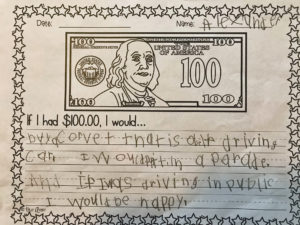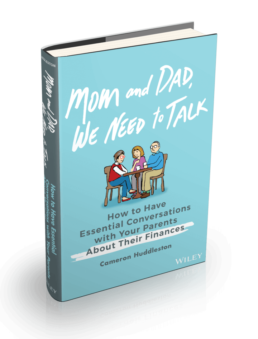I’ve been a guest on a lot of podcasts lately talking about my new book, Mom and Dad, We Need to Talk: How to Have Essential Conversations With Your Parents About Their Finances. As you can assume by the title, I’ve been sharing tips on how adult children can get their parents to open up about their finances so everyone can get on the same page if those children ever need to step in and help their parents.
Occasionally, though, the podcast hosts will turn the tables on me and ask what sort of money conversations I’ve had with my own children. I’ve been asked how I teach my kids about money, what sort of details I’ve given them about my finances, and what works and doesn’t work when it comes to teaching kids about personal finance.
I don’t claim to be an expert on kids and money. But as a mom of three kids ages 7 to 14, I’ve had plenty of experience teaching my own children money lessons. Here are five key things about money that I’ve tried to instill in my children.
Money Is Not a Taboo Topic
A couple of years ago, my middle child asked me out of the blue one day why people think it’s bad to talk about money. She couldn’t understand why the topic might be off limits because money is discussed so openly in our family.
Borrowing from the wisdom that my friend and financial psychologist Dr. Brad Klontz shared with me, I explained to my daughter that people avoid talking about money because they feel shame around it. If the topic comes up in a conversation, they feel ashamed if they have less than the people they’re talking to – or if they have more money. They’re afraid they’ll be judged, I told her.
I remember my dad telling me when I was growing up that it wasn’t polite to talk about money. So he didn’t – which meant I didn’t have anyone teaching me about money. Once I got out into the real world, I had to figure out money matters on my own and made plenty of mistakes as a result.
I don’t want my kids to think that money is a taboo topic. That’s why I’ve been talking to them about it pretty much from the time they were able to talk. I want them to become financially responsible adults one day, so I consider it my job to teach them about being smart with their money. After all, if I don’t teach them, who will? Only 17 states require high school students to take a course in personal finance, according to the Council for Economic Education.
More importantly, I don’t want my kids to have negative associations with money. If I raise my children to believe that money is something you don’t talk about, they might develop an unhealthy relationship with it. That sounds extreme. But Dr. Klontz has found through his years of research that people with negative beliefs about money are more likely to do things that will hurt their financial well-being.
Money Must Be Earned
My husband and I believe that it’s important for our kids to understand that money must be earned. That’s why we don’t simply hand our kids a weekly allowance. They have to do chores to get paid.
My kids have to pitch in and do some things without getting paid because they’re expected to contribute to our family. These chores include doing their laundry, caring for our pets, keeping their rooms tidy and cleaning up after themselves. They can earn money by doing additional chores — such as cleaning all the bathrooms in the house, doing yard work, or, in the case of my daughters, babysitting their younger brother.
We want them to know that they have to do something to earn money – rather than expect handouts from us – because that’s how it works in real life. You have to have a job or create a source of income because money doesn’t magically appear in your wallet.
I’m not suggesting that our approach to chores is the best. However, it’s what aligns with our belief system and has, so far, encouraged our kids to be enterprising in finding ways to make money. My oldest (pictured below) recently got her first “real” paycheck by helping out with the summer camp at the climbing gym where we are members. Her willingness to spend several hours of her day to help young kids learn to climb paid off with cash that will help boost her savings.

Make Saving a Priority
My oldest daughter is a natural saver. She’s been stashing every cent she’s earned or received as a gift since she was a small child. My second child, on the other hand, was ready to spend every dollar as soon as she got it – that is, until I was able to show her the benefits of saving.
With young children, it can be hard to explain the benefits of saving for the future when they don’t even have a good concept of time. I found that it was easier to teach my second daughter the benefit of saving by tying it to something tangible. For her, that was toys.
As I said, she would want to spend her cash on something – anything – as soon as she got it. I helped her realize that by saving small amounts she would have more money over time to get something she truly wanted and would enjoy more than a cheap trinket.
It might seem counterproductive to encourage a child to save money just so she can spend it down the road. But it helped my daughter learn delayed gratification. Now that she’s 12, I talk to her about saving money for more important things. I’m sure my teachings have sunk in. She has a couple hundred dollars set aside (my oldest has several hundred). And she now encourages her younger brother to save up for the things he really wants rather than buy little things he won’t enjoy nearly as much.
It’s OK to Spend, But Don’t Waste Money on Junk
As I’m sure you can tell from what I wrote about how I introduced the concept of saving to my daughter, I don’t have a problem with my kids spending their money. They’ve earned it, so they should have a choice in how they spend it. If I told them exactly what to do with their money, they wouldn’t have experience making decisions on their own – which could create problems down the road when the decisions they have to make will have bigger financial implications.
However, I believe that it’s my job as a parent to help them learn how to make good spending choices. I’ve taught them to understand the trade-offs: spending more of your money means less in savings. And I try to teach them about spending their money on things they value and will offer the most value for their money.
I say “try” because this is still very much a work in progress with my son. I have no doubt that he’s a natural spender, and he loves accumulating things. In his mind, the more, the better. So it’s been more of a challenge to get him to understand that he shouldn’t waste his money on stuff that I know will end up forgotten and shoved in the back of his closet within a matter of days.
I haven’t given up, though. Whenever he wants to use his money to buy something, I ask him to think about how much he’d really play with that thing. Then I ask him to consider whether there’s something else he could spend his money on that he would enjoy more. If he’s still insistent on getting the toy I know he won’t play with for more than a few minutes, I ask him to wait a couple days then decide whether he still wants it. By that point, he’s usually forgotten that item he was so desperate to have in the moment.
I think this is important reminder for adults, too. It’s good to give ourselves a cooling off period before buying something. We should step back and ask whether it will really add value to our lives. It helps to know what you value because it will be easier to decide whether what you want to spend money on what aligns with your values.

Be Grateful for What You Have
I think the biggest challenge many of us face when it comes to money is resisting the urge to keep up with the Joneses or to buy things just to impress other people. I will admit that I struggle with this.
My dad didn’t talk about money when I was growing up, but he impacted my beliefs about money with his actions. I wouldn’t call him a big spender, but he certainly wanted to dress to impress in nice suits and drive an expensive car. The message that he sent to me was that portraying an image of wealth was important and that you should care what other people think about you.
I don’t want my kids to think this way because it can lead to spending beyond your means. I’ve told them that just because someone has nice things or a lot of stuff doesn’t mean they’re rich. It could mean they’re deep in debt trying to live a life they can’t really afford.
I’ve also told my kids that there will always be people who have more than they do. However, there are also people who have less – much less. I want them to realize that even though I don’t get them everything they want (not even close), they have a lot already. And they should be grateful for that.
After all, money won’t make you happy. Yes, it can make life easier if you have enough to cover your bills. It can make life enjoyable if you use it for fun experiences. And it can make like fulfilling if you use it to help others. But all the money in the world won’t make you happy if you aren’t grateful for what you have and are always longing for more.
Don't Miss Out! ORDER NOW!
"An excellent step-by-step guide to navigate what can be time-consuming, uncomfortable conversations."
- Michelle Singletary, The Washington Post
Related Posts
April 23, 2019
5 Smart Money Moves Stay-at-Home Parents Should Make
Parents who leave the workforce to…

Cameron Huddleston
I am the author of Mom and Dad, We Need to Talk: How to Have Essential Conversations With Your Parents About Their Finances. I also am an award-winning journalist with 20 years of experience writing about personal finance. My work has appeared in Kiplinger’s Personal Finance, Forbes.com, Yahoo!, MSN, and other online and print publications.





[…] What I teach my kids about money (Cameron Huddleston). How one personal finance writer is instructing her kids. […]
[…] What Cameron teaches her kids about money […]